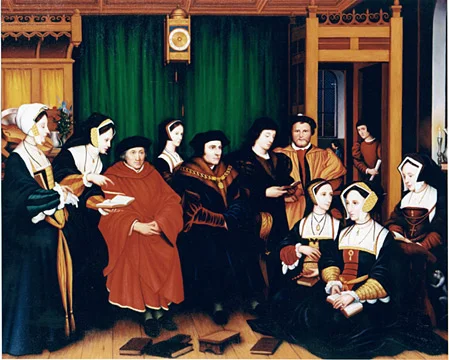Controversies in Thomas More Studies
“Thomas More as author of Margaret Roper’s letter to Alice Alington”
Why would Sir Thomas More write a letter to Alice Alington under the name of Margaret More Roper? To answer that question, this essay examines the political and familial circumstances of the letter’s composition, its artfully concealed designed of forensic oratory, and use of indirect argument.
“Church Scandal through the eyes of St. Thomas More”
The image of Christ in prayer, wracked by sorrow, grief, fear, and weariness, inspired Thomas More’s final work, which is often referred to as The Sadness of Christ. As More awaited his own trial and execution, he addressed “the story of that time when the apostles were sleeping as the Son of Man was being betrayed.” Astonishingly, More claimed that this scene in the gospel was “a mysterious image of future times.” More justified a figurative and even prophetic reading of Christ’s betrayal for a single reason. He believed that Christ was “betrayed into the hands of sinners” whenever “an imminent danger” threatened “the mystical body of Christ, the Church of Christ.” As a result, More intended to provide his readers with a universal, perennial message that could be applied to any age.
Should Thomas More be considered England's lost Renaissance poet? This essay investigates the printing and reception of More's vernacular verses in light of the Marian restoration of Catholicism, including More's overall treatment as a martyr, an opponent of heresy, and the political uses of his reputation. In the context and events of 1556–57, More's status as a poet diminishes while his public persona as a divinely inspired author of theological controversies grows.
"Thomas More and the 'genius' of Utopia"
Was Thomas More a "genius"? This essay examines the meaning and English translation of the Latin word ingenium in the prefatory letters to the 1518 edition of Utopia. In the context of the classical oratorical tradition and its important iteration and adjustment in De copia (1512–34), the uses of ingenium indicate how humanist readers of Utopia assessed More's rhetorical abilities.
"Sir Thomas More and his Opposition to Henry VIII in 1533"
Biographers and historians typically view the months leading up to Anne Boleyn’s June, 1533 coronation as the time of More’s retirement to Chelsea, full of isolation and anxiety, and for writing “bitter, ugly, almost unreadable books” against heresy. From More’s publications against William Tyndale and Christopher St. German to crucial events like parliament’s approval of the Act in Restraint of Appeals, however, I find More’s so-called retirement from office a time full of polemical battle and political intrigue.
"From Thomas More’s Workshop: De Tristitia Christi and the Catena aurea"
Imagine Thomas More’s cell in the Tower of London, what he calls his “shop,” and his books, what he refers to as his “implements.” In such a shop and with these tools, More produces his “goods,” among which we count his De Tristitia Christi. On June 12, 1535, the King’s Council determines More’s books shall be taken away from him. According to More’s early biographer, Thomas Stapleton, More keeps his blinds drawn down day and night after that. When his jailer asks why, More replies: “Now that the goods and the implements are taken away, the shop must be closed.” Less than a month afterwards, More’s trial and execution occurs. What are these “implements” that More values so much?
"Wolf Hall: Tudor History through an Anti-Historical, Anti-Catholic Lens"
As Downton Abbey and Sherlock have raised the ratings of Masterpiece television, PBS has just launched a new sensation on Sunday nights: Wolf Hall. The new six-part miniseries on Tudor politics and the Protestant Reformation is based on Hilary Mantel’s bestselling Wolf Hall: A Novel and its sequel Bring Up the Bodies.
Though More's quip could be apocryphal, it represents well enough what R. S. Sylvester calls More’s "sharp and ironic view of both himself and others," a provocative deployment of wit, which More’s admirers often ignore and his critics frequently misunderstand.
"Why Thomas More is the Patron Saint of Statesmen"
Wolf Hall, the recent novel-turned-television series, raises the question of who is right about the actions and legacy of Thomas More (1478-1535) and Thomas Cromwell (1485-1540). The stakes are higher than many realize.
"Humanist Lawyer, Public Career: Thomas More and Conscience"
Because Thomas More did not introduce grand programs of Utopian policy through new legislation, or modify the fundamental nature of British law with principles of humanist jurisprudence, most scholars regard More as a follower of Cardinal Wolsey’s legal innovations and not much of a reformer himself. This essay will challenge that perception, presenting More as a humanist reformer by examining the importance of equity to humanist legal and rhetorical studies and by showing how More viewed the law as part of the liberal arts.
“A ‘Pre-Machiavellian Moment’: Thomas More’s Poetry and The History of Richard III”
Did More write his History to provide a factual account of Richard’s rise to power, or practice his skills of declamation, or to dramatize a moral fable? No study exists that shows how the History relates to the political themes of More’s poetry, though both were written during the same period. This groundbreaking essay shows how the History develops several political themes advances in More’s Latin and early English verses.





